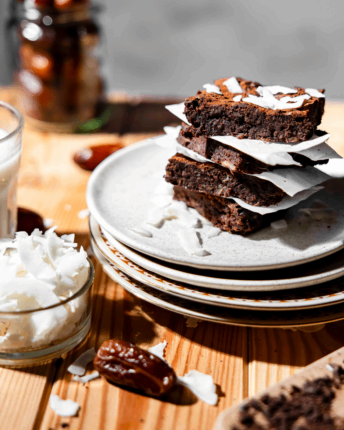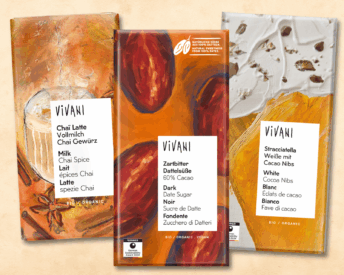Dates – a super fruit
Discover the origin, ingredients and uses of the new ingredient in our chocolate
Text:
Katharina Kuhlmann
Photography:
© Kilian Kuhlmann, © Kati Neudert
24 September 2025
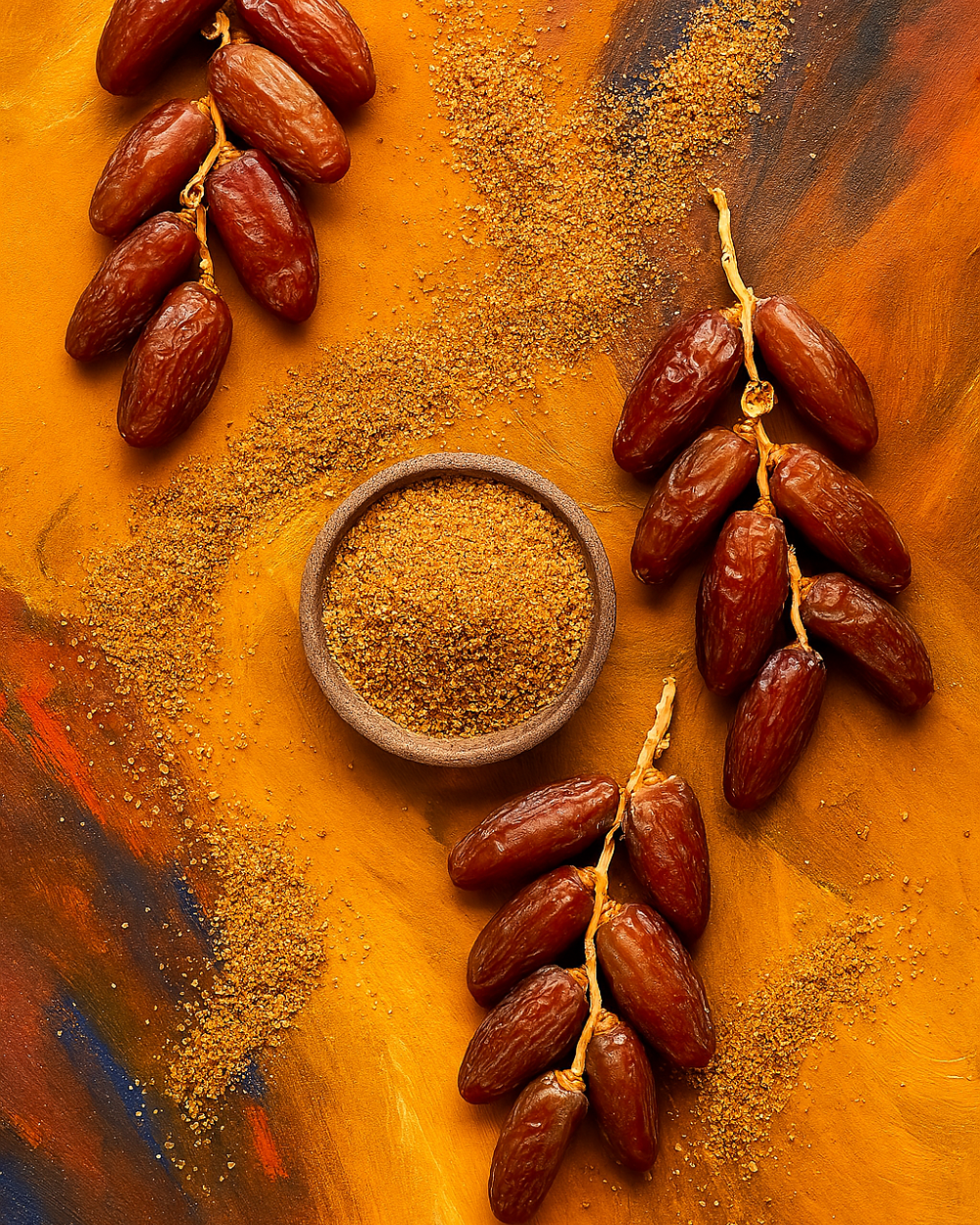
The VIVANI “Dark Date Sugar” chocolate bar contains an alternative to granulated sugar that we have not used before: date sugar. The finely ground sweet dates lend the chocolate a unique subtle caramel-like aroma. Dates are becoming increasingly popular and have a long-established reputation as a good natural sugar substitute, but what is so special about dates? Where are they from? What do they contain? And how environmentally friendly are they?
The bread of the desert
Dates are generally associated with desert regions and the Arab world. And this comes as no surprise, as the fruits of the date palm have played an important role in these countries for thousands of years. They are valuable trade goods, a traditional part of Islamic culture and have always been a symbol of life, fertility and prosperity.
As one of the oldest cultivated plants in the world, the date palm has spread from its origins in the Persian Gulf to across the Arabian Peninsula and North Africa. These days Egypt, Saudi Arabia and Iran, as well as California in the USA, are among the main producers of the global date harvest, with an annual volume of over nine million tons. These regions are especially well-suited to the climatic requirements of the palms which produce the so-called “bread of the desert”. However, despite it being a plant from desert regions, date palms require an enormous amount of water to grow. As a result, they tend to be grown near water-rich oases.
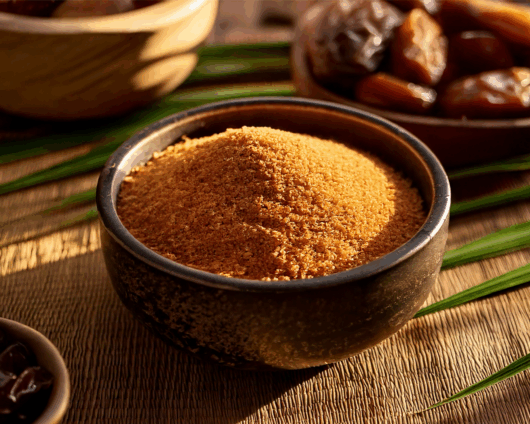
Date, the super fruit – appearance, taste and composition
Dates are not born equal. With around 1,500 different varieties, the fruit can vary massively in terms of their appearance, consistency and flavour. The oval stone fruit can be between two and six centimetres in size and can range in colour from red to yellow, brown and even black. They can be fleshy, soft and juicy, like the popular Medjool date, or more floury and tough. The sweet, caramel-like flavour can include other flavour notes, such as honey, raisins or chocolate.
Dates are rich in dietary fibres, vitamins (e.g. vitamins A, B and K) and minerals (like potassium, magnesium and iron). But they predominantly consist of natural sugars, that gently affect blood sugar levels. As such, they make a popular snack, a quick source of energy and are a good natural sugar substitute. But chemically speaking, date sugar is viewed as a sugar and, as such, should only be used sparingly.
Dates – a versatile fruit
Thanks to their high sugar content, pure dates are a popular energy-rich snack. Their sweet flavour is also ideal for use in sweet dishes, such as in pastries, smoothies, ice cream, mueslis or cereal bars. Dried dates can be used for this purpose without any additional preparation. Products like date syrup and date sugar are now available on the market and are making dates even more accessible. Date sugar can be used in a similar way to caster sugar. It is created by simply grinding the fruit into fine granules. We use this type of date sugar in our new VIVANI “Dark Date Sugar” chocolate bar with 60% cocoa content.
Dates are also used in hearty cuisine. Examples include the popular starter “bacon-wrapped dates”, combined with (cream) cheese or in spicy vegetable dishes and hearty stews – dates are far more versatile than people often think.
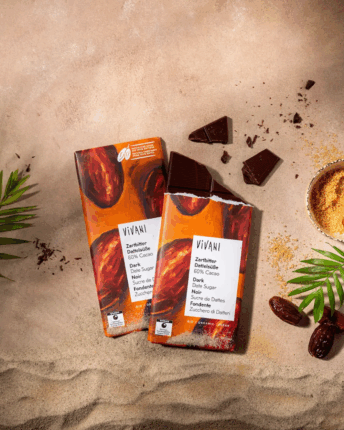
The environmental question
But the supposed wonder fruit also has its downside. And this is primarily linked to its environmental impact. The high water consumption makes mass cultivation in typically dry growing regions problematic.
Fresh dates are also difficult to handle as they are very sensitive to transportation and quickly spoil. As such, they need to be cooled the entire route and this is very energy-intensive. To reduce their carbon footprint, people in northern Europe should look to eat the less sensitive, dried dates.
When purchasing dates, make sure the fruit is organic. Conventional products are often covered in glucose syrup to make them look more appealing and some are treated with preservatives. Pesticides are used during their cultivation and these are prohibited in organic farming.
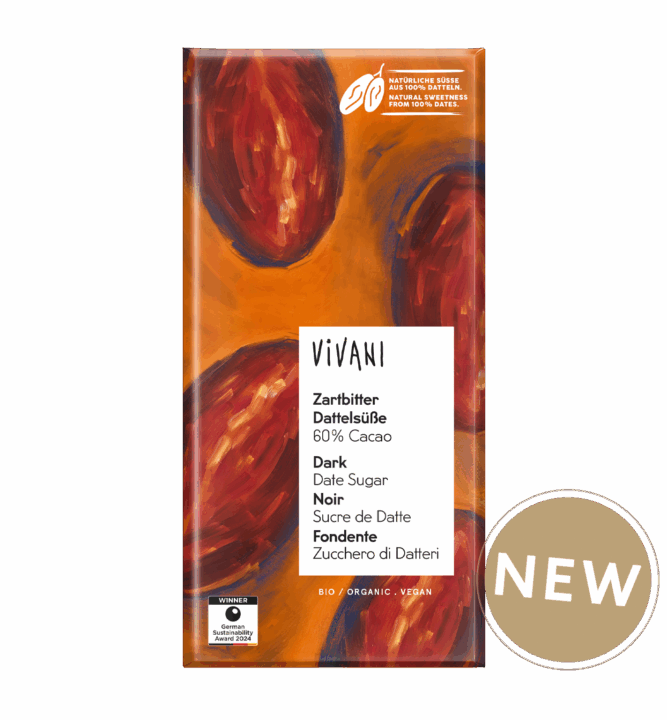
Dark Date Sugar
60 % Cocoa | vegan | natural sweetness from 100% dates
AVAILABLE FROM MID-FEBRUARY
Related
If you like it, you also like ...
Recipes
Verwandte Artikel
The Chocolate Journal

